Publications
For submission of articles or Working Papers to CEsA, please send an email to:
comunicacao@cesa.iseg.ulisboa.pt
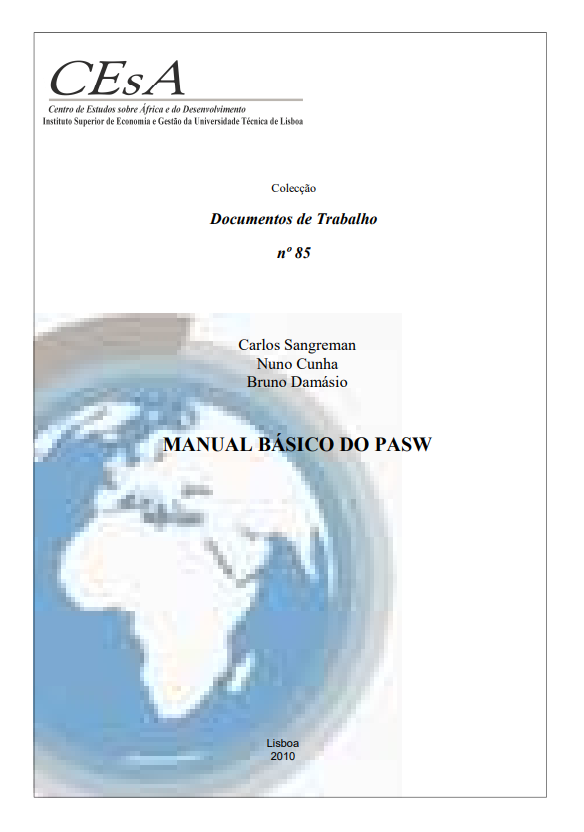
Working Paper 85/2010: Manual básico do PASW
Abstract:
The text of this Manual básico do PASW started to be constructed for a training course in Guinea Bissau in 1999, as part of the project “Welfare Observatory in a suburban district of Bissau” financed by the Ministry of Labour and Solidarity (now Ministry of Labour and Social Security) and implemented by the Guinean NGO Association for Development (AD). It is intended to explain a quick and efficient way to use PASW Statistics 18 (ex-SPSS) in data management and analysis. That is, the way in which the data approach can be carried out in the field of social sciences using descriptive statistics. The best way to circumvent several intrinsic vicissitudes in the process of creating a database in the program in question is highlighted. Not only is the introduction of elementary statistical concepts worthy of note, as well as their application within the scope of procedures inherent to the treatment of information collected in the context of a survey. This Manual is an evolving work that was expressly constructed to teach statistical data collection in Africa to people with that kind of work and with very practical concerns, so that these technicians have their capacities extended in a sustained manner, without increasing their dependence on the outside.
Quotation:
Sangreman, Carlos . Nuno Cunha e Bruno Damásio. 2010. “Manual básico do PASW”. Instituto Superior de Economia e Gestão. CEsA – Documentos de Trabalho nº 85/2010.
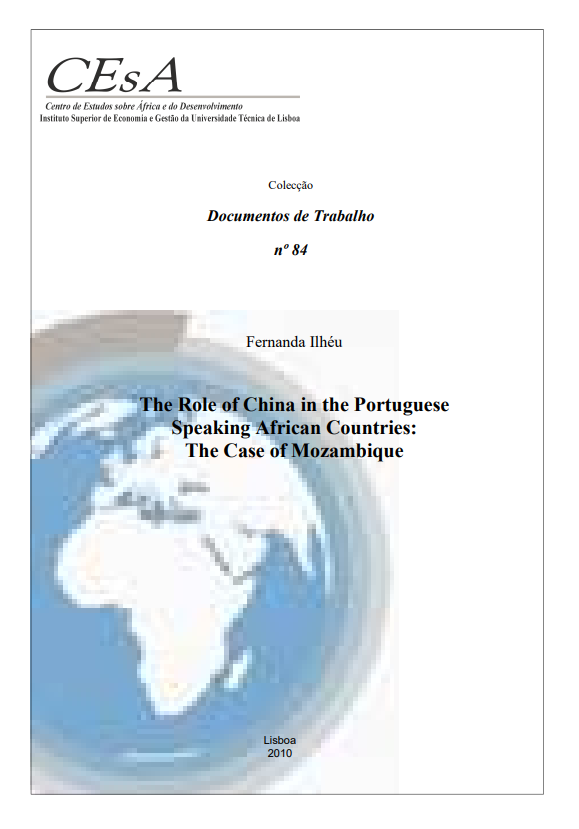
Working Paper 84/2010: The role of China in the portuguese speaking african countries: The case of Mozambique
Abstract:
Due to the Reform and Open Door Policies initiated in 1978, China recorded a fast sustainable economic growth with an estimated average GDP growth rate of 9.7% in the period of 1980-2008, turning China — in 2009 — into the world’s second largest economy, just after USA. With an export oriented economic model, highly supported by FDI, mostly from developed countries, China is, since 2002, the most attractive developing country for FDI flows, both at short and long terms, becoming not only the world’s factory, but also its number one exporter, after surpassing Germany in 2009. With the biggest current account surplus balance, China has been able to achieve a foreign exchange reserve of US$ 2.2 trillion — the world’s largest reserve currency. Around 50% of this huge reserve is being applied in American bonds, while the remaining supports Chinese health and social security systems, Chinese banks’ solvability, internationalization of the Chinese economy, investment in geostrategic positioning to guarantee energy independence and making foreign aid available to other developing countries. During 2008’s global crisis, China was able to resist better than the major world economies even benefitting from this downturn to implement policies to reduce its economic imbalances. One of these imbalances is the gap between Chinese FDI and OFDI which is now progressively narrowing. In fact, in the near future, OFDI is expected even be larger than FDI. Mostly two types of Chinese OFDI can be distinguished: trade-oriented investment and resource-seeking investment. Governmental backing, including official developments assistance (ODA) has been crucial for the resource-seeking investment. Although the Chinese investment is nowadays more oriented to mature economies, its bulk is mainly directed to the other developing countries mainly to Latin American countries and now also to African countries. Following the Beijing Consensus, Chinese planners are pushing partnerships with African countries and within those, the Chinese government identified one strategic group worth to cooperate and invest, the Portuguese Speaking African Countries which are linked through a network of language and culture between themselves and also to other geostrategic economic spaces; to Europe via Portugal, to Latin America via Brazil and to Asia via Macau. These African countries have high expectations on the Chinese cooperation and our research questions are: (a) Should this investment be consider ODA or OFDI; (b) How far can Chinese finance flows contribute to the development of these countries in terms of employment, exports, technology transfer; (c) is this investment seen as an opportunity or a threat by local people, is it fulfilling the created expectations or not? In The role of China in the portuguese speaking african countries: The case of Mozambique our empirical case is researching the perception of Mozambique government on the ODA and OFDI Chinese investment there, and the conclusions were reached by analyzing the Mozambique government high officials opinions publically expressed or resulting from their answers to media inquires. We also will try to find secondary data with information on the perception of the population on China presence in Mozambique through secondary data.
Quotation:
Ilhéu, Fernanda. 2010. “The role of China in the portuguese speaking african countries: The case of Mozambique”. Instituto Superior de Economia e Gestão. CEsA/ Documentos de Trabalho nº 84/2010.
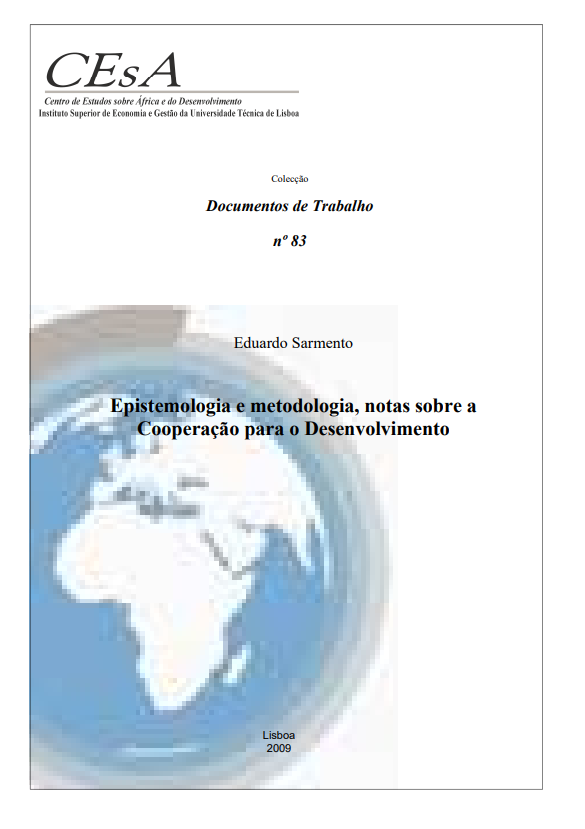
Working Paper 83/2009: Epistemologia e metodologia, notas sobre a cooperação para o desenvolvimento
Abstract:
The discussion about what is meant by epistemology, what is its status and its role as a discipline has been perpetuated as a controversial topic over the years. This situation is not unrelated to the fact that we are dealing with a topic that is likely to take on different perspectives depending on the scientific background of the authors involved, as well as the fact that epistemology constitutes a scientific field that is difficult to define due to its numerous borders with other areas. In Epistemologia e metodologia, notas sobre a cooperação para o desenvolvimento, we had to assume some options and define its scope, as it is not our intention to start an exhaustive discussion about the history of its evolution and the different perspectives, but only to frame the main aspects underlying its characterization, in order to if it is possible to continue for the construction of a theoretical body that allows framing and deepening the proposed analysis theme with the current research project. We can then begin by focusing our attention on the notion of episteme from which the term epistemology comes. Traditionally, according to the Greeks, this term means ‘knowledge’. However, if we briefly look at the historical discussion of epistemology, we quickly see that there are different perspectives, essentially coming from the classical tradition, from Platonic and Aristotelian philosophy. In the first place, it is a question of the existence of a “truth”, that is, the existence of a “truth”, that is, the existence of a “truth”, that is, the existence of a “truth”. In fact, since Plato, knowledge can be characterised as a justified belief that presupposes the answer to the original question of what it is to know.
Quotation:
Sarmento, Eduardo. 2009. “Epistemologia e metodologia, notas sobre a cooperação para o desenvolvimento”. Instituto Superior de Economia e Gestão. CEsA – Documentos de Trabalho nº 83/2009.
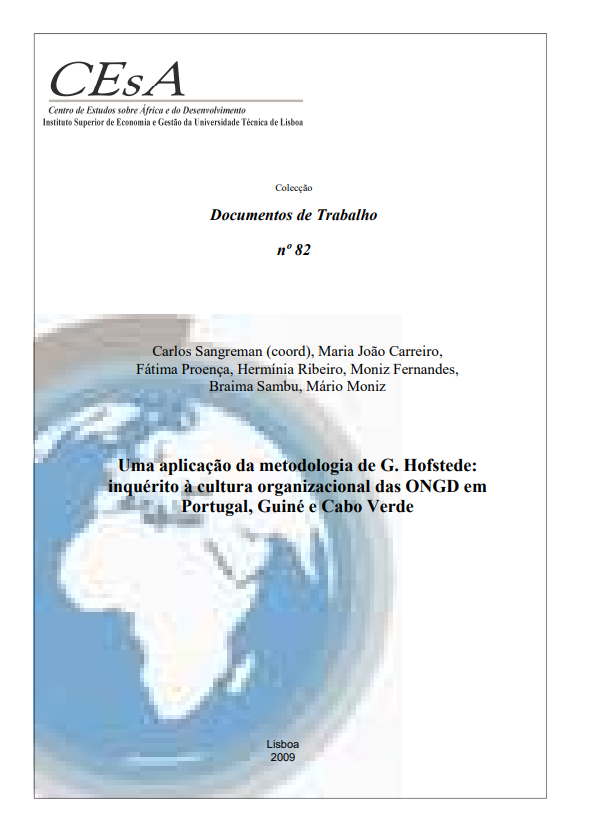
Working Paper 82/2009: Uma aplicação da metodologia de G. Hofstede: inquérito à cultura organizacional das ONGD em Portugal, Guiné e Cabo Verde
Abstract:
PROCODE has as one of its objectives to characterize three of the actors of decentralized cooperation: public higher education establishments – Universities and Polytechnic Institutes -, NGDOs and Municipalities. Uma aplicação da metodologia de G. Hofstede : inquérito à cultura organizacional das ONGD em Portugal, Guiné e Cabo Verde concerns the analysis of data collected by a survey bulletin and by interviews with NGDOs, intervening in Portugal, Cape Verde and Guinea – Bissau, in 2007 and 2008. It seeks to characterize the organizational culture of the NGDOs of these three countries to understand how these actors work in Cooperation, in the logic of the Cooperation Actors Model that the Project has developed. Given that the non-governmental sector has been organized in the three countries with a lot of contact between its members, even beyond the more professional aspects, the expectation of the usefulness of this data clearly goes beyond the Project, being able to constitute a valuable element of management for the Platforms of NGDOs of any of the countries, as well as for a better mutual understanding on the part of the other actors/intervenes in the Cooperation.
Quotation:
Sangreman, Carlos … [et al.]. 2009. “Uma aplicação da metodologia de G. Hofstede : inquérito à cultura organizacional das ONGD em Portugal, Guiné e Cabo Verde”. Instituto Superior de Economia e Gestão. CEsA – Documentos de Trabalho nº 82/2009.
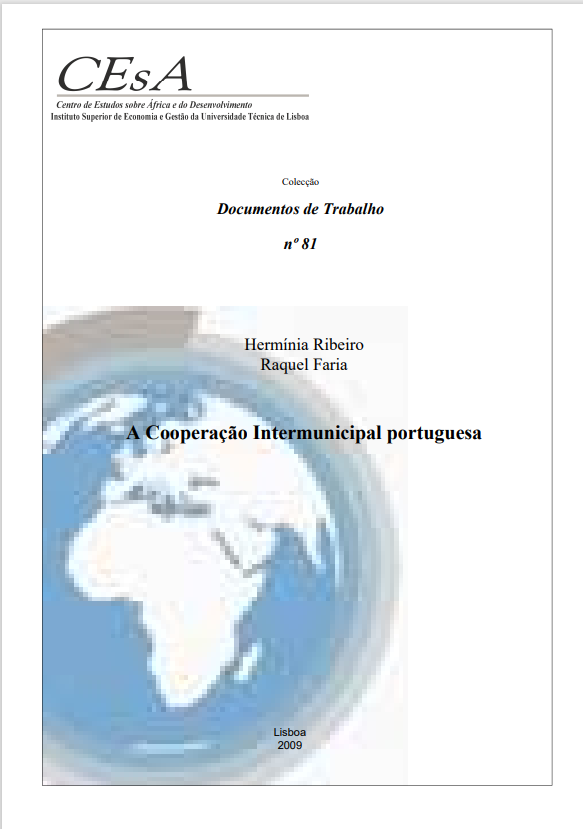
Working Paper 81/2009: A cooperação intermunicipal portuguesa
Abstract:
The decentralized cooperation due to the dimension and importance that it assumes on a scale not only local but also global, contemplates different types of action, strategies, contractual forms… being accompanied by a wide range of factors, among which stands out “(…) the active participation of the various agents in all stages of the process (…)“ (MNE, 2006:40), one of the main agents that assumes the responsibility of ensuring this same participation, are the Municipalities or similar entities depending on the organizational system of each country. It is precisely in this sense that we speak, in A cooperação intermunicipal portuguesa, of Intermunicipal cooperation (CIM), which, very briefly, corresponds to a form of decentralized cooperation in which the municipalities involved assume the role of active participation in development processes (Afonso, 1998). : 25), which can assume different modalities/areas that go through twinnings, protocols, cooperation/collaboration agreements and networks. Having referred to the decentralized cooperation that followed the inter-municipal cooperation as a typology of that, as we have already seen, I consider it to be of paramount importance to mention the following aspect: decentralized cooperation is not limited to an internal scale, but also to a external scale.
Quotation:
Ribeiro, Hermínia e Raquel Faria. 2009. “A cooperação intermunicipal portuguesa”. Instituto Superior de Economia e Gestão. CEsA – Documentos de Trabalho nº 81/2009.
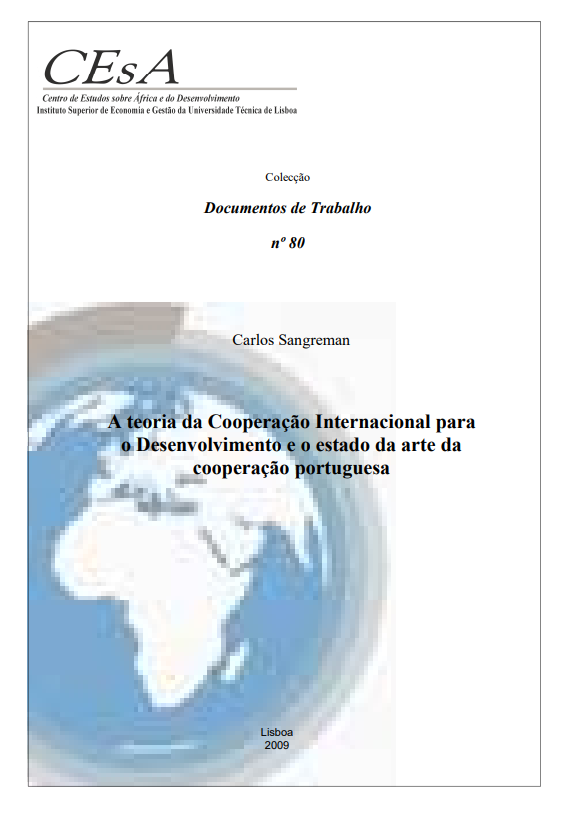
Working Paper 80/2009: A teoria da cooperação internacional para o desenvolvimento e o estado da arte da cooperação portuguesa
Abstract:
A teoria da cooperação internacional para o desenvolvimento e o estado da arte da cooperação portuguesa aims to contribute to an evolution of the discipline’s autonomy, by proposing a reading of the activity and the actors of the International Cooperation for Development – CID in Portugal. The emergence of a research practice that the creation in 2004 of the African Studies area at the Foundation for Science and Technology – FCT facilitates, the scheduling and editing facilities that the Institute for Portuguese Cooperation – ICP and current Instituto Português de Apoio to Development – IPAD provides its employees to attend master’s degrees in the area and publish their theses in their own collection, the institutionalization of research and teaching that we see in the emergence of master’s degrees, postgraduate courses, modules and disciplines on CID in different Universities, Higher Education Schools and Polytechnic Institutes, as recently at the University of Minho, or the incentive for doctorates that provides the creation of a specific program in the recent Autonomous Section of African Studies at ISCTE, inserted in the area of Sociology, or the recent doctoral program in the area of development at ISEG, makes us believe that Portugal is developing a process of improving knowledge about CID, which, despite appearing years after what is already being done in countries such as the United Kingdom, Canada, France, Sweden or the Netherlands, has the advantage of being able to learn from what “ international cooperation community” has done and continues to do.
Quotation:
Sangreman, Carlos. 2009. “A teoria da cooperação internacional para o desenvolvimento e o estado da arte da cooperação portuguesa”. Instituto Superior de Economia e Gestão – CEsA Documentos de Trabalho nº 80/2009.
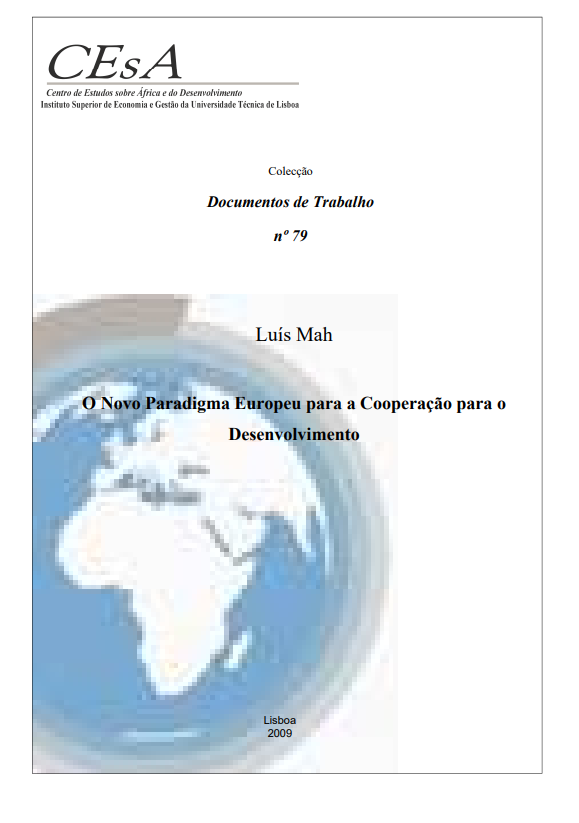
Working Paper 79/2009: O novo paradigma europeu para a cooperação para o desenvolvimento
Abstract:
The European Union (understood as the set composed of the European Commission and the Member States) is the world’s largest provider of official development assistance (ODA), the main trading partner of developing countries and a crucial actor in international political dialogue. Development cooperation policy represents the main pillar of relations between the European Union (EU) and all developing countries. In November 2005, the approval of the “European Consensus on Development” by the Council of Representatives of the Governments of the Member States meeting in the Council of the European Union, by the European Commission and by the European Parliament, defined a new institutional framework guiding the entire EU action in the area of cooperation with developing countries. Among the main instruments for implementing this vision is the ODA granted by European States and government agencies. The document adopted in 2005 replaced the first EU Development Declaration of 2005, in order to respond to new international events such as September 11 and security concerns, and to reflect the global partnership around the Millennium Development Goals (MDGs). O novo paradigma europeu para a cooperação para o desenvolvimento precisely analyzes the implementation of this type of ODA in light of the commitments made in the declaration.
Quotation:
Mah, Luís. 2009. “O novo paradigma europeu para a cooperação para o desenvolvimento”. Instituto Superior de Economia e Gestão. CEsA – Documentos de Trabalho nº 79/2009.
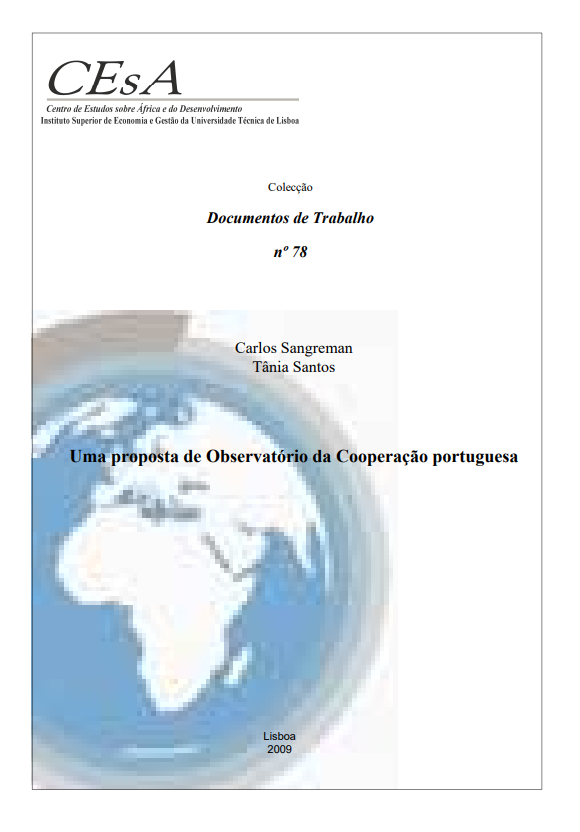
Working Paper 78/2009: Uma proposta de Observatório da Cooperação portuguesa
Abstract:
In Uma proposta de Observatório da Cooperação portuguesa we study the discussion on the impacts of development aid that has evolved in the sense of recognizing the complexity of elements that condition the evolution of well-being and economic growth indicators in developing countries. In this way, the search for explanations for the persistence or even worsening of poor living conditions in the developing countries and the scarcity of ODA results has paved the way for reflection on the functioning of international institutions and aid, noting, for example, the need to strengthen their accountability, transparency and participation mechanisms (Wenar, 2006: 1). However, the recognition, within the international community of donors, that the management and governance models of international aid are not adequate to the international objectives of reducing poverty in the developing countries, often contributing to exacerbate the weaknesses of their public administration systems , being at the same time not very transparent and scrutiny, is relatively recent, from the late 90s of the 20th century. It is in 2005, with the Paris Declaration on Aid Effectiveness, that a commitment is reached between OECD DAC countries and partner countries to reform the way in which development aid is provided and managed. In this sense, principles of action for donors and recipients were defined in order to a) support the strengthening of capacities in developing countries to define their priorities and poverty reduction strategies, improving their institutions and fighting corruption; b) align development aid with the objectives defined by the developing countries and with the local systems of administration; c) harmonizing the actions of donor countries, avoiding duplication of efforts and simplifying administrative and bureaucratic procedures, in order to make the implementation of aid on the ground more effective and efficient; d) focus aid on the results to be achieved (and on their measurement); e) to hold both donors and partners accountable for the results achieved by development aid (OECD, 2005). Since 2005, the countries of the South, in a context of change in the international system with the entry of new actors in cooperation for development, such as China, have been reinforcing their voice in the discussion of global governance. In this sense, they have been proposing changes to improve the predictability of aid, change technical assistance and make it dependent on developing countries (and not on donors), reduce conditionality, use national systems and strengthen South-South cooperation (Schulz , 2008: 2). In fact, the construction of more balanced relations in the international system of cooperation for development takes place in a context of great imbalance of power in which the risk tends to always be assumed by the poorest countries (ODI, 2006: 2). In this way, it is important to include in the discussion of global governance, the role of citizens in donor countries (and their relations with the citizens of the South), to which donors respond directly, viewing them as elements in a chain of connection between citizens and governments of the South and the governments of the countries of the North. It is in this chain of feedback mechanisms at various levels, which makes the governance of cooperation very complex, that it seems fundamental to us to look for the concrete mechanisms that promote multilevel governance in cooperation.
Quotation:
Sangreman, Carlos e Tânia Santos. 2009. “Uma proposta de Observatório da Cooperação portuguesa”. Instituto Superior de Economia e Gestão. CEsA – Documentos de Trabalho nº 78/2009.
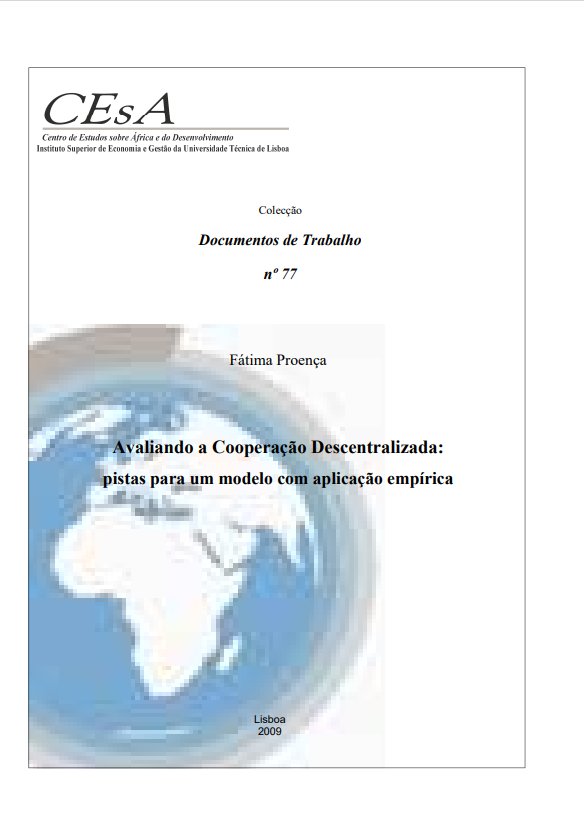
Working Paper 77/2009: Avaliando a cooperação descentralizada: pistas para um modelo com aplicação empírica
Abstract:
Since the object of Avaliando a cooperação descentralizada : pistas para um modelo com aplicação empírica is the search for clues for new forms of evaluation in Decentralized Cooperation, it will only touch the question of evaluation focused on results laterally – in the tendentially dominant definition of “results” as that which is quantifiable. In fact, empirical knowledge leads to questioning the recent orientation of “management by results”, defined by most international donors. It is a question of questioning whether this orientation does not in itself imply a devaluation of the role of evaluation, since monitoring and performance reports are designed to contain, in principle, only the elements sufficient to allow the function of controlling results, in a summative evaluation model. This document will, therefore, pay particular attention to issues related to the elements of differentiation and added value expected in the CDD, which implies that we focus primarily on topics such as the evaluation of the process, the participation of the actors, the links between the and impact, between qualitative results and sustainability, as well as issues related to innovation and experimentation. It will also look at assessment as a way of validating strategies and updating knowledge – in short, looking for clues to configure an assessment that does not focus on the control function, but rather the assessment that seeks to focus on the joint learning function. , in capacity building to improve future intervention.
Quotation:
Proença, Fátima. 2009. “Avaliando a cooperação descentralizada : pistas para um modelo com aplicação empírica”. Instituto Superior de Economia e Gestão. CEsA –Documentos de Trabalho nº 77/2009.
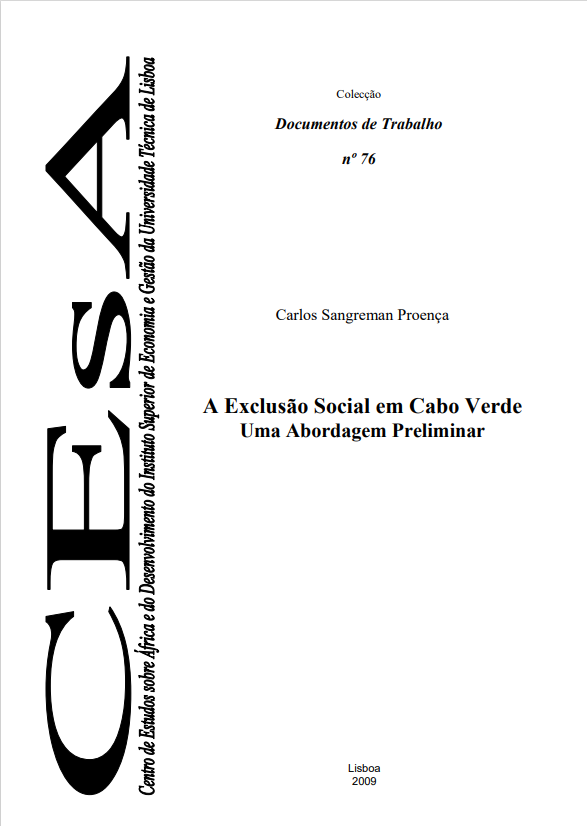
Working Paper 76/2009: A exclusão social em Cabo Verde: uma abordagem preliminar
Abstract:
A exclusão social em Cabo Verde: uma abordagem preliminar is an introductory study of the issue of social exclusion in Cape Verde, being an innovative topic for the country, faced a problem of lack of academic and social background reflections. In other words, on the one hand, there are few or no research works in the university world on the subject of social exclusion in less developed countries, defending the more or less consensual thesis in the scientific community, that the dominant phenomenon is poverty and not social exclusion; on the other hand, Cape Verde is a country in transition quite successfully from a lower level of development to a higher one. As a result, it finds itself in the situation of still having many problems of poverty, but it is probably already beginning to contain the germs of social exclusion in its social fabric, making a process very similar to that of European countries. This situation gives rise to a deep articulation between poverty and exclusion and makes it difficult to distinguish one from the other in the country’s development process. But it also implies an increasingly evident need to reflect on a topic that runs the risk of being (unconsciously or not) socially hidden and the object of public policies only when it has already reached dimensions that seriously affect social cohesion.
Quotation:
Sangreman, Carlos. 2009. “A exclusão social em Cabo Verde: uma abordagem preliminar”. Instituto Superior de Economia e Gestão. CEsA – Documentos de Trabalho nº 76/2009.





